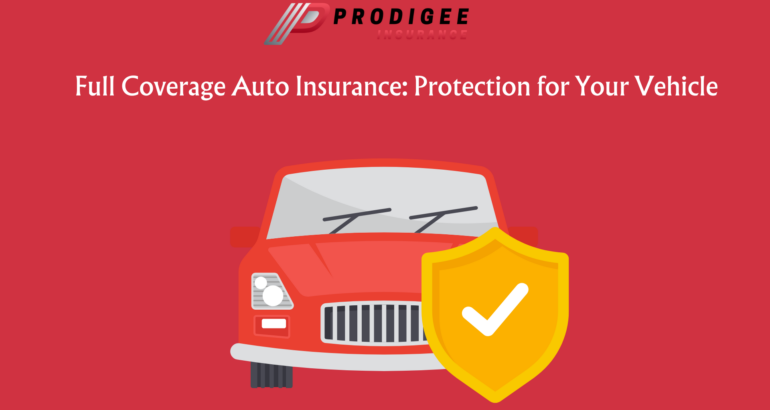
Full coverage auto insurance is a term often used to describe a combination of insurance coverages that provide extensive protection for your vehicle. While it’s a commonly used term, it’s important to note that “full coverage” doesn’t refer to a specific insurance policy but rather a collection of coverages that go beyond the minimum requirements mandated by your state. In this article, we’ll delve into what full coverage auto insurance typically includes and who should consider purchasing it.

Components of Full Coverage Auto Insurance:
- Liability Coverage: This is the foundation of any auto insurance policy and is usually required by law. It covers injuries and property damage you may cause to others in an accident.
- Collision Coverage: Collision coverage pays for repairs to your vehicle in the event of an accident, regardless of fault. This coverage is especially valuable if you have a newer or more expensive car.
- Comprehensive Coverage: Comprehensive coverage protects your vehicle from non-collision-related damage. It covers incidents such as theft, vandalism, fire, hail, and hitting an animal. This coverage is often required if you have a car loan or lease.
- Uninsured/Underinsured Motorist Coverage: This coverage steps in if you’re involved in an accident with a driver who either has no insurance or insufficient coverage to pay for your medical bills and damages. It’s a critical component in states with a high number of uninsured drivers.
- Medical Payments (MedPay) or Personal Injury Protection (PIP): These coverages help pay for medical expenses for you and your passengers in the event of an accident, regardless of fault. PIP often provides more extensive coverage and may include benefits like lost wages and rehabilitation costs.
- Gap Insurance: If you owe more on your car loan or lease than the vehicle is worth, gap insurance covers the “gap” between the car’s actual cash value and the amount you owe in case of a total loss.

Who Should Consider Full Coverage Auto Insurance?
- New or Valuable Vehicles: If you have a new or expensive vehicle, full coverage insurance is advisable to protect your investment.
- Financed or Leased Vehicles: Lenders and lessors typically require collision and comprehensive coverage as a condition of the loan or lease agreement.
- Drivers in High-Risk Areas: If you live in an area with a high rate of accidents, theft, or vandalism, full coverage can provide added peace of mind.
- Frequent Commuters: If you use your car for daily commuting or long-distance travel, you may be at a higher risk for accidents and should consider comprehensive coverage.
- Drivers Concerned About Uninsured Motorists: In regions with a significant number of uninsured or underinsured drivers, this additional coverage can be essential.
- Financially Prudent Drivers: Full coverage auto insurance can provide financial security by covering unexpected repair or replacement costs, potentially preventing financial strain.
Final Thoughts
Full coverage auto insurance offers robust protection for your vehicle and can be a wise choice for many drivers. However, the right coverage for you ultimately depends on your individual circumstances, the value of your vehicle, and your risk tolerance. To make an informed decision, consider speaking with an insurance agent or broker who can help you tailor a policy that suits your needs and budget.

